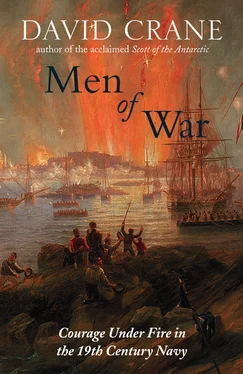These were all the more obvious, too, because the Sea Horse had arrived at Constantinople at a juncture in the city’s history that was bloody even by its own violent and unstable standards. The contorted negotiations with Britain had from the first been conducted against a background of riots and rebellion, and a frenzy of beheadings, strangulations, mutilations and traditional Ottoman family planning – two hundred women of Mustafa IV’s harem were drowned in the Bosphorus – that had only paused for the murder of the Sultan and the ascent to the throne of a man to whom terror was the supreme instrument of policy.
With his jet-black beard, his great breadth of shoulder, an eye that ‘awed’ strangers and an ‘air of indescribable majesty’, as Hobhouse put it, Mahmud II had the appearance to match his character. ‘Those who know him,’ Adair’s successor as ambassador to the Porte, Sir Robert Liston, wrote of the man against whom Hastings would expend his fortune and, ultimately, his life, ‘say he had considerable abilities, a vigorous and active mind, with such an idea of the elevation, perhaps of the sanctity of his station, and so strong a feeling of personal superiority that he deems all opposition criminal, all resistance vain and ultimate disappointment on his part impossible.’
It would be intriguing to know what the young Hastings said of him, and there is no doubt that he saw him at least once. ‘Mann’d the yards and saluted the Sultan with 21 guns upon his passing the ship in his caique,’ reads the Sea Horse log for 6 March, ‘mann’d the yards and saluted the Sultan on his return.’ In its way, that glimpse was as crucial as the single, fleeting vision of Nelson from the quarterdeck of Neptune . With great swathes of the city still smouldering from the fires of the Sultan’s mutinous Janissaries, and France and Russia both threatening Ottoman integrity, Hastings could be forgiven for underestimating the man, but he would have had no trouble in recognising a natural enemy. Corrupt, despotic, violent, vulnerable, Mahmud II was everything a young Whig aristocrat could ask for. And so, too, for a born incendiary like Hastings, was Constantinople. As the Sea Horse weighed for Malta, Robert Adair’s mission accomplished, the memory of its burning suburbs, enfeebled defences and – still only a glint in the eye of even the most far-seeing naval moderniser in 1809 – its vulnerability to any ship capable of forcing the Dardanelles, left an impression that made those months among the most important of Hastings’s life.
IV
For Frank and the Sea Horse the return to Malta in the spring of 1809 meant the welcome resumption of business as usual. After her long inactivity the ship finally quitted the Dardanelles at sunset on 29 March, and by 12 April was again in Valetta where Stewart mustered the ship’s company to make ‘known to them the Lords Commissioners of the Admiralty’s approbation of their conduct in capturing the Turkish frigate’.
There was prize-money to be distributed – if not as much as they reckoned their deserts – but after three years in the Sea Horse , and growing at long last, as Stewart wrote to tell his father, it was time for the fifteen-year-old Hastings to move on. In July 1808 he had completed the requisite sea-time to be rated midshipman, and back in England Sir Charles was already mobilising old Jersey connections to secure his son’s next ship. ‘I shall be anxious to know when you have settled with Sir J. Saumarez about Frank,’ Stewart wrote to Sir Charles from Sicily in December 1809, at the end of another successful summer and autumn cruise that included two brilliant assaults on the fortresses on Isola di Giannutri and Pianosa,
as unless something particular occurs I do not propose coming home next year unless it may be late in it & I would send Frank to you in April with a discharge into Sir J’s ship which would secure his time: I have this last time at Malta given Frank a sum of money and made him buy his own clothes which by the by are now very expensive … I have now wound up all his accounts to this day & find him still £16 in my debt but he shall not draw till he finally goes as he will necessarily want some more. I have been as moderate in his expenses as I could consistent with the high price of things and his going & living like a Gentleman. He behaves exceedingly well & I like him much.
If Admiralty records are to be believed, Frank was not discharged from the Sea Horse into Victory until 6 May 1810, but between the two ships there was Willesley, a ‘delighted’ mother and a determined father to see. He ‘understood from Lady Hardy’, Sir Charles was soon writing to Warren Hastings’s son-in-law,
that you and Lady Imhoff are both intimate with the Captain of Victory, on board of whom my son Frank is to go, will you have the goodness (previous to your quitting town) to leave him a letter of recommendation to your friend. He will find it very useful when on board as thro’ the Captain’s means he may be placed under the care of some Lieut. which is what I would wish as I cannot expect Sir James Saumarez will do any more than admit him on board.
After the excitements of the Sea Horse , and the light and the colour of Sicily, the Aegean and the Dardanelles, it was a return for Frank to the dull realities of home ports and blockade duties with the Baltic Fleet. In spite of the official entry date he did not join Victory until October 1810, and he was back at Willesley again by 15 December – ‘the date of the Regency’, as Sir Charles triumphantly dated Frank’s arrival – putting his father to work to find him something more interesting than a winter’s guard duty at Spithead. ‘I have been in town for a few days in consequence of my youngest son,’ Sir Charles wrote to Warren Hastings a month later, ‘who required my exertions to place him on board a sloop of war to cruise the channel … It was his own choice to employ the few months he has to finish his time in studying that most important though very dangerous navigation.’
This was a period of feverish political expectations for the extended Hastings clan, as Lord Moira came within a whisker of forming a government, but for Frank the next two years were probably the quietest of his whole career. It is difficult to trace his exact movements during this time through the usual Admiralty records, but by the autumn of 1812, after another summer at Willesley studying with a clergyman tutor, he was again exploiting family interest to smooth over the next step in his career. ‘I am obliged to be in town the 1st week in Sept,’ Sir Charles explained to Warren Hastings, ‘on acct of my younger son, whose time of serving as a midshipman will be near expired and I must not be out of the way.’
The first great hurdle for any midshipman, ideally taken at the age of twenty after the requisite six years’ sea-time, was the demanding examination to make lieutenant. In exceptional cases – or where powerful interest could be brought to bear – the age criterion might be fudged or falsified, but even a boy as well connected as Frank would seem to have had to do it the hard way, and to wait until just after his twentieth birthday in April 1814 for his promotion. *
Hastings was on the North America station at the time – the United States had declared war on Britain two years earlier – but it was only a matter of luck that he was alive to make lieutenant at all. Sometime late in 1813 he had taken a passage out to join the sloop Atalante under the command of Frederick Hickey, and early in November, as a nineteen-year-old acting lieutenant, found himself in heavy fog off Halifax when the distant sounds of a frigate’s cannon were mistaken for the signal guns at the lighthouse on Sambro Island.
Читать дальше











